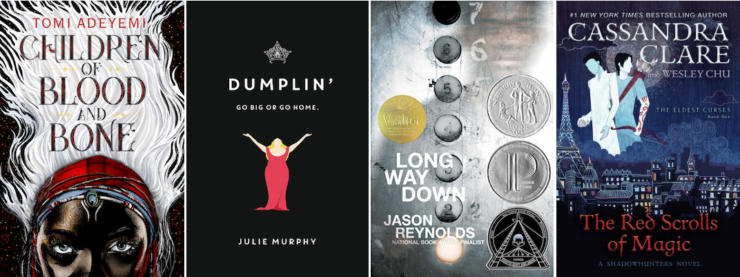What does a young maji trying to restore magic have in common with a plus-size girl entering a teen beauty pageant? Despite taking place in such different settings, both stories—Tomi Adeyemi’s Children of Blood and Bone and Julie Murphy’s Dumplin—are epic in their emotional stakes. Along with Cassandra Clare (The Red Scrolls of Magic) and Jason Reynolds (Long Way Down), they spent the BookCon panel Epic YA discussing how to balance expansive worlds with relatable characters, and how sometimes the most epic moments are the smallest ones.
Read the entire live-tweet thread below:
Our #BookCon19 live-tweeting continues with Epic YA! Featuring @tomi_adeyemi @cassieclare @JasonReynolds83 @andimJULIE talking epic fiction across genres.
So with books ranging from Children of Blood and Bone to Dumplin, what does epic mean to these authors? @tomi_adeyemi references a contemporary novel where regardless there was an emotional moment so powerful that “I heard the Interstellar soundtrack, my body was shaking…
…Anything you get lost in that takes over, you start having a fight-or-flight response even though you’re standing in a calm place.” @tomi_adeyemi
@cassieclare agrees that a story is epic “when the stakes are high, the emotional heft of the story is big.”
“I have no idea,” @JasonReynolds83 answers honestly, going on to say that “epic” is “how can I take a normal thing and turn it into something that feels so far away, just by recognizing the intricacies of human existence.” #BookCon19
How do the panel’s fantasy writers balance expansive worlds with relatable characters?
@tomi_adeyemi admits that’s one of her weaknesses, that she’s plot-first and then “I spend every draft trying to figure out how the characters are working within the plot, changing the plot.”
@tomi_adeyemi: “For me fantasy has to be esp human. Most popular fantasy series of our day don’t do it for me bc I don’t care about these people. I don’t care if they all get killed by a dragon. … If all of you die & it doesn’t affect me, I’m just waiting for it to happen.”
@cassieclare agrees that because writers of fantasy are demanding a higher suspension of disbelief from their readers, “if they don’t believe those people are real, and their interpersonal conflicts are real, then they won’t believe in the dragons and magic.”
“I know I’ve cracked a character when I’m in love with something about that character,”
@tomi_adeyemi says–especially when writing multiple POVs from opposing characters: “I have to agree with what the character is fighting for, and what they believe.”Same for @cassieclare, who when writing opposing characters asks herself, “‘How is this person a little bit right, or how do they believe themselves to be right?'”
The conversation turns to choice of setting, to context and framing. @JasonReynolds83: “Characters in my books who are ‘over-the-top’… are not over-the-top, if you come from that community.” #BookCon19
.@tomi_adeyemi says that people assume cool experiences have to be big and flashy, but for her it’s the small, intimate moments–like getting tagged into a rec of “If you loved Children of Blood and Bone, you’ll love Avatar: The Last Airbender” when A:TLA was a major inspiration.
The panel reminisces on meeting authors they admire:
For @JasonReynolds83, it was R.L. Stine.
Megan Whalen Turner for @cassieclare: “We fangirl at the things that are important to us, that were formative parts of our lives, that are significant to who we are + what shaped us.”
@cassieclare sums it up best: “They gave us the gift of living in the world of their imagination.”
@andimJULIE to @cassieclare: “I’m still sweating from the first time I met you.”
From the audience: Do you have any regrets about what you write?
@tomi_adeyemi talks about never being satisfied with her writing: “I think that’s something we get to do with all the books we write. You should always see something you can do better and then try to do it better.”
“I think it’s a little naive to believe you’re not gonna mess it up,” @JasonReynolds83 says. He’ll reread his books and realize where he could have done more with certain characters: “Social conversations change. The work is static.”
@cassieclare cites the extreme kind of discourse that says that a book is either perfect or awful: “You can and should admire and/or criticize pieces of a thing, rather than to adore or discard the whole thing.”
An appropriate way to end a panel discussion on different definitions of epic, and where the most “epic” stories can be found in the small moments.










